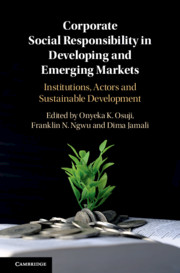 Corporate Social Responsibility in Developing and Emerging Markets
Corporate Social Responsibility in Developing and Emerging Markets from Part III - Normative and Utility Perspectives
Published online by Cambridge University Press: 18 December 2019
The chapter considers the role of Islamic finance in promoting the Sustainable Development Goals (SDGs) in developing countries. The SDGs require unprecedented mobilization of funds to support their implementation. Given the social and moral ethos and emphasis on prohibition of riba (interest) and asset-backed financing, Islamic finance offers an effective non-traditional means of financing for sustainable development activities and projects in developing countries. This chapter demonstrates that the ideology of Islamic finance, its attributes, principles, products, instruments and institutions all tend to be well-suited to boosting the SDGs. It also shows that Islamic finance has great potential in supporting developing countries’ efforts to finance the SDGs agenda. Divided into seven sections, the chapter outlines sustainable development from an Islamic perspective, and the principles of Islamic finance, before assessing the role of Islamic financial institutions, sukuk (Islamic bonds), and Islamic social finance (zakat and waqf) in promoting the SDGs.
To save this book to your Kindle, first ensure [email protected] is added to your Approved Personal Document E-mail List under your Personal Document Settings on the Manage Your Content and Devices page of your Amazon account. Then enter the ‘name’ part of your Kindle email address below. Find out more about saving to your Kindle.
Note you can select to save to either the @free.kindle.com or @kindle.com variations. ‘@free.kindle.com’ emails are free but can only be saved to your device when it is connected to wi-fi. ‘@kindle.com’ emails can be delivered even when you are not connected to wi-fi, but note that service fees apply.
Find out more about the Kindle Personal Document Service.
To save content items to your account, please confirm that you agree to abide by our usage policies. If this is the first time you use this feature, you will be asked to authorise Cambridge Core to connect with your account. Find out more about saving content to Dropbox.
To save content items to your account, please confirm that you agree to abide by our usage policies. If this is the first time you use this feature, you will be asked to authorise Cambridge Core to connect with your account. Find out more about saving content to Google Drive.